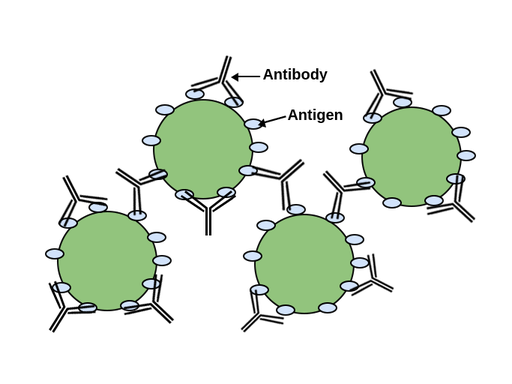Antigens and antibodies are entities related to the immune system. An antigen is a harmful foreign substance that brings about an immune response in the body, thereby stimulating the production of antibodies. Antibodies are glycoproteins produced in response to the entry of specific antigens into the body. They help in eliminating the antigens by the action of the antibody-mediated immune response.
This article will help you understand the main concepts and critical differences between antigens and antibodies.
Index
What is an Antigen?
An antigen is a molecule or molecular structure or any foreign particulate matter or a pollen grain that can bind to a specific antibody or T-cell receptor. Each antigen is characterized by distinct surface features, also known as epitopes resulting in specific responses. The immune response, in turn, activates lymphocytes in the blood, which are the body’s infection-fighting white blood cells.

Antigens are broadly categorized into two divisions: heteroantigens or foreign antigens (or non-self antigens) and autoantigens (or self-antigens):
- Non-self Antigens: As the name suggests, foreign antigens are external factors which enter our body. Examples include parts of substances produced by viruses or microorganisms.
- Self-Antigens: Autoantigens are produced within the body. Under normal conditions, the body is able to distinguish self from non-self, but when this ability is lost, the person suffers from autoimmune disorders.
What is an Antibody?
Antibodies or immunoglobins are specific glycoprotein molecules that are produced by the B cells of the immune system when exposed to antigenic fragments. They have a characteristic Y-shaped structure. Each antibody molecule contains a domain known as a paratope which recognizes the epitope on an antigen. This mechanism is equivalent to the lock-key binding action. This binding helps to eliminate antigens from the body, either by direct neutralization or by ‘tagging’ for other arms of the immune system.

Antibodies are grouped into five classes based on their constant region. Each class is designated by a letter attached to an abbreviation of the word immunoglobulin: IgG, IgM, IgA, IgD, and IgE.
Following is a brief description of these 5 classes:
- IgG: the most abundant type of antibody in the plasma. Responsible for detoxifying harmful materials and provision of long-term protection.
- IgM: these are the first antibodies made by B cells in response to antigenic fragments.
- IgA: These antibodies are responsible for collecting antigens and eliminating them from the body by the means of body fluids.
- IgE: These antibodies play a role in triggering allergies. Small amounts are present in the skin, lungs, and mucosal membranes.
- IgD: These antibodies bind to B cells and signal them to release IgM antibodies.
Differences between Antigens and Antibody
Now that we have understood what exactly Antigen and Antibody are, let’s look at this table which highlights all the critical differences between them:
| Antigen | Antibody |
| Antigens are foreign substances that trigger an immune response in the body. | Antibodies are produced by the B cells in the body that recognize and eliminate the antigens. |
| Chemically they can be proteins, lipids, nucleic acids, or carbohydrates. | Chemically they are only proteins. |
| There are two types: Self-antigen (produced from the body itself) and Non-self antigen(from external source). | There are five types of antibodies: IgM, IgE, IgG, IgD, and IgA. |
| The domain which acts with the antibody is called Epitope. | The domain which acts with the antigen is called Paratope. |
| Responsible for causing disease and medical complications in the body. | Responsible for providing protection to the body against antigens. |
FAQs
Out of the five categories of antibody molecules, IgM has the largest size. It is the first antibody that is synthesized in response to an antigenic attack.
The acquired immune system, with help from the innate system, makes special proteins (called antibodies) to protect the body from a specific invader. Antibodies are proteins that work to attack, weaken, and destroy antigens.
Similar Articles
